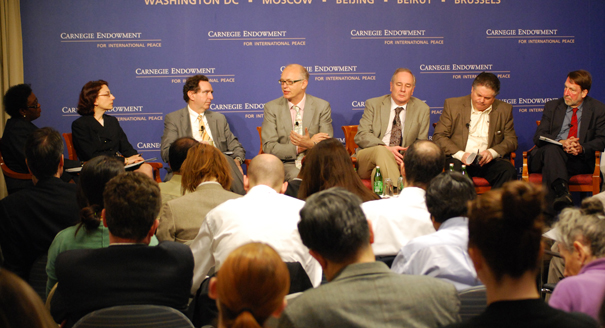Registration
You will receive an email confirming your registration.
IMGXYZ3596IMGZYXThe UN secretary-general’s new five-year action agenda identifies sustainable transport as one of five building blocks of sustainable development. Yet transport is virtually invisible in the initial framing of Rio+20, the June 2012 UN Conference on Sustainable Development.
Carnegie hosted a panel of experts, including the UN’s Elisabeth Thompson, Polly Trottenberg of the U.S. Department of Transportation, Lawrence Gumbiner of the Bureau of Oceans, International Environmental and Scientific Affairs, the World Bank’s Marc Juhel, Michael Replogle of the Institute for Transportation and Development Policy, Cornie Huizenga of the Partnership on Sustainable Transportation, and Gordon Feller from Cisco, to discuss how sustainable transportation policy can be incorporated into international agreements. Carnegie’s Dan Sperling moderated.
Top-Down vs. Bottom-Up
- Governance at All Levels: A key message of Rio+20 is going to be the increasing presence and power of state, regional, and local governments, explained Gumbiner. This is important for transportation projects, which require coordination and cooperation among different levels of government.
- Participation at All Levels: Thanks to new technologies, people throughout the global community, from students to business owners to large organizations, will be able to participate in Rio+20. Gumbiner expressed hope that expanded participation will result in country governments, business leaders, and private actors making pledges based on their realistic ability to advance the sustainable development agenda.
- International Agreements: The international failure to arrive at any binding global climate change agreements has created a “global summit fatigue” in transportation policy discourse, Replogle said. He suggested that, given this failure, the process of transforming transportation is more likely to be driven by small-scale investment and action at the local level.
- Bottom-up Pressure: Using new communication technologies, small business entrepreneurs are already filling local and regional gaps in transportation systems, Feller added. Instead of substantial infrastructure spending, members of the private sector advocate for the integration of smart technology into already existing transport systems, in order to do “more with less.”
- Small Steps and Big Steps: Many small steps can be taken by local and regional governments and private companies, including the adoption of policies that encourage telecommuting by public and private sector employees, said Feller. However, Huizenga added that many challenges, such as the fast rate of urbanization in emerging economies and the resulting pressure on transportation systems, will have to be addressed at a more centralized level.
Green Economy as an Opportunity
- Transport and the Economy: While “transportation is basically a large conveyor belt that keeps the economy running” it does not receive the attention it deserves, argued Juhel. Thompson added that it is impossible to shift to a green economy without including sustainable transport as one of the key concepts.
- Sustainable Growth: Transitioning to a green economy is an opportunity for emerging economies to adopt new technology and policies to continue growing more sustainably, asserted Gumbiner.
- Avoid, Shift, Reduce: Huizenga pointed out that it important to prevent China from becoming the new United States, which uses 15 percent of global oil supplies for its transportation sector. This requires a shift from the current transportation model of “building your way out of congestion” to a new “avoid, shift, reduce” paradigm, Huizenga added. This second paradigm aims to reduce the need for travel, shift transport to the most efficient mode, and make necessary motorized transport more efficient.
- Prevent Damages: Transportation policies implemented in emerging economies today will shape the transport system these countries rely on tomorrow concluded Huizenga Focusing on sustainable transport policies for developing countries now is essential to avoid the burden of highly energy intensive transportations systems and prevent costly damage control.
Moving Forward
- Language: In order to influence the negotiation process, those who are seriously interested in sustainable transport need to start lobbying member states to adopt sustainable transport language in the zero draft document, which is the basis the Rio+20 discussions, Thompson argued.
- Finances: Thompson also highlighted the need for stakeholders, including national and international development institutions, to support a sustainable transport agenda financially.
- U.S Domestic Policy: While the U.S. transportation sector is still energy intensive, a number of measures have already been taken to advance a sustainable transport agenda, said Trottenberg. These measures include the implementation of more stringent Corporate Average Fuel Economy standards this summer, the use of grant programs to encourage non-automobile modes of transportation, and better roadway, transit, and aviation systems management.
- Explicit Goal: Sustainable transport must be transformed from an implicit objective underlying many other development goals to an explicit goal itself, concluded Juhel It needs to become part of mainstream policy and financing frameworks.
